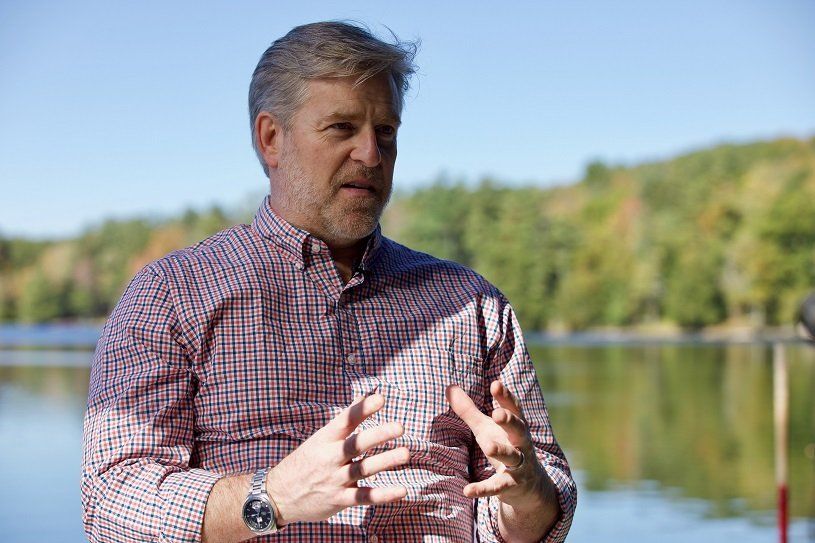Image: Thankful4Farmers co-founder, Kim McDonnell
Thankful4Farmers was built on a poignant message: “Once in your life you need a doctor, a lawyer, a policeman. Every single day, three times a day, you need a farmer.”
In 2019, founders Kim McDonnell and Mike Chuter launched the social enterprise as a way to provide support for Australian agriculture and regional communities. An initiative bringing together industries, brands, influencers and consumers, Thankful4Farmers amplifies awareness of the issues facing farmers, while also generating scalable funding to support sustainable agriculture and regional communities.
When Covid reached Australian shores, international boarder closures locked out many working holiday-makers, leaving farmers short an estimated 26,000 workers. Understanding this dire situation, Thankful4Farmers established The NEW GAP Year in 2020, an initiative encouraging school-leavers to consider farm work as an alternative to the traditional gap year.
With offices located throughout regional Australian communities, and hearing first-hand the challenges the labour shortage is presenting to agricultural employers, Acclaimed Workforce has joined forces with Thankful4Farmers in its NEW GAP Year initiative, to help farmers across the country fill jobs with homegrown workers.
Here, we talk to Kim and Mike about the NEW GAP Year initiative, the benefits it offers farmers, and working in partnership with Acclaimed Workforce.
What made you launch The NEW GAP Year initiative?
K: The need for labour on Australian farms became apparent very quickly when Covid hit. It shone a light on how reliant we are on international seasonal labour. We saw this as an opportunity to shift this model and implement the kind of systemic change that could make our farmers and farming communities more self-sufficient and resilient. Yes, we'll always need some international labour, but we can also supplement this with local labour.
M: Last year, the Lost Crop Register announced there was up to $60 million-worth of crops that were wasted, because there just wasn't enough people to harvest. As a consequence, we heard farmers were making the decision not to plant as much because they knew borders would be closed and they didn't want to be in the same position as last year.
Are you expecting the labour shortage to continue into 2022, even when international travel resumes?
K: Absolutely. And I don’t think this is just an issue affecting agriculture: it's regional and rural communities as a whole. Farmers are competing with hospitality employers for the same pool of employees. The NEW GAP Year isn't a band-aid solution, it's helping us build a workforce here in Australia, helping to solve a systemic issue.

Image: Thankful4Farmer's co-founder, Mike Chuter
How does The New Gap Year appeal to young Australians?
M: That was the question when we first began: how can we utilise the 25 percent of 180,000 school leavers who would normally go abroad for their gap year?
We know these young Australians will go to these regional communities and have the experience of a lifetime, so we created a platform that reflected this. When the problem initially became apparent, there were websites and government initiatives popping up everywhere but, for a young person, the plethora of information was overwhelming and complex.
K: We're not government-driven, so we can talk to this audience in a fun and engaging way, that makes them want to participate. We've created a platform that gets young Aussies excited about getting out there and helping Australian farmers with their harvest, and we've made the information on how to do that so much more accessible.
M: Last year we reached more than a million young Australians, but this year we're already getting 10 times more engagement. Everyone is fatigued after lockdown, and our message is: "sick of lockdown? Get out of town". We're also working with universities and schools to help promote the message and get even more young Australians filling jobs.
Some agriculture jobs require specific training and skills. How do you facilitate this?
K: It's not just a labour shortage that's impacting our farmers, but also a skilled labour shortage. To address this, we've partnered with the NSW Summer Skills program, who offer thousands of free training courses to those aged between 18 and 24.
There's really no limit on the free skills training offered to them. It varies to everything from doing a barista course to driving a forklift!
We've also developed a Gap-Ready module that teaches basic work knowledge, such as getting a Tax File Number and writing a resume. The kind of things that those who already have careers may take for granted – this helps them get into the industry and feel confident.
The Gap-Ready program also teaches them about knowing their rights, and what to do if there's a situation where they don’t feel comfortable. That’s why it's so important we work with Acclaimed Workforce, because all of the due diligence is done. Auditing is performed to ensure everyone is paid correctly, the farm is verified, and the consultants make sure all OHS is in-line with best practice.
Why is this partnership with Acclaimed Workforce so important to The NEW GAP Year?
K: This partnership is critical. We have a jobs marketplace where Acclaimed Workforce lists the jobs farmers have available, and we attract workers from there.
And any support we get from Acclaimed Workforce is greatly appreciated. This kind of support means we can engage more young people, fill more roles for farmers and drive these people to the regions.
If you're an agriculture employee looking for staff, contact Acclaimed Workforce today. We can provide a job-ready workforce to help fill roles in regional and rural areas.



